Communication and Teamwork
Library Support Staff Handbooks
The Library Support Staff Handbook series is designed to meet the learning needs of both students in library support staff programs and library support staff working in libraries who want to increase their knowledge and skills.
The series was designed and is edited by Hali Keeler and Marie Shaw, both of whom teach in support staff programs and have managed libraries.
The content of each volume aligns to the competencies of the required and elective courses of the American Library AssociationAllied Professional Association (ALA-APA) Library Support Staff Certification (LSSC) program. These books are both textbooks for library instructional programs and current resources for working library staff. Each book is available in both print and e-book versions.
Published books in the series include:
- Foundations of Library Services: An Introduction for Support Staff
- Library Technology and Digital Resources: An Introduction for Support Staff
- Cataloging Library Resources: An Introduction
- Working with Library Collections: An Introduction for Support Staff
- Communication and Teamwork: An Introduction for Support Staff
- Supervision and Management: An Introduction for Support Staff
Communication and Teamwork
An Introduction for Support Staff
Hali R. Keeler
Marie Keen Shaw
Library Support Staff Handbooks, No. 5
Rowman & Littlefield
Lanham Boulder New York London
Published by Rowman & Littlefield
An imprint of The Rowman & Littlefield Publishing Group, Inc.
4501 Forbes Boulevard, Suite 200, Lanham, Maryland 20706
www.rowman.com
Unit A, Whitacre Mews, 26-34 Stannary Street, London SE11 4AB
Copyright 2019 by Hali R. Keeler and Marie Keen Shaw
All rights reserved . No part of this book may be reproduced in any form or by any electronic or mechanical means, including information storage and retrieval systems, without written permission from the publisher, except by a reviewer who may quote passages in a review.
British Library Cataloguing in Publication Information Available
Library of Congress Cataloging-in-Publication Data Available
ISBN 978-1-5381-0762-1 (hardback : alk. paper) | ISBN 978-1-5381-0763-8 (pbk. : alk. paper) | ISBN 978-1-5381-0764-5 (ebook)
 The paper used in this publication meets the minimum requirements of American National Standard for Information SciencesPermanence of Paper for Printed Library Materials, ANSI/NISO Z39.48-1992.
The paper used in this publication meets the minimum requirements of American National Standard for Information SciencesPermanence of Paper for Printed Library Materials, ANSI/NISO Z39.48-1992.
Printed in the United States of America
To library educators, library support staff, and library users:
We are a powerful team
Contents
Preface
Libraries today are community information centers where patrons expect a wide variety of both individual and group programming and services. By necessity, supervisors and directors increasingly dedicate most of their focus to executive leadership and fiscal management. Librarians and support staff are the face of the library and must work efficiently and effectively to provide the day-to-day services.
Trained library support staff (LSS) should know the basic concepts of interpersonal relations, customer service, teamwork, and communication. The range and diversity of staff in todays library require that support staff understand and implement these basic principles. This book, Communication and Teamwork: An Introduction for Support Staff , contains essential strategies about interpersonal relations, customer service, teamwork, and communication. It is important because there are currently no books on the market today that directly address how LSS communicate effectively and enhance teamwork on the job. LSS members are generalists who are required in their work to have practical knowledge of principles that they can apply to effectively help patrons with their questions or needs. They are also required to work with others in the most productive and efficient manner to accomplish common goals and improved services. LSS need to know how to communicate effectively with patrons, staff, and others and to be able to work in teams to further the services of the library.
Communication and Teamwork: An Introduction for Support Staff has broad appeal. Other books on this topic of communication and teamwork are written at a level that is aimed for professional librarians and not support staff. However, 85 percent of LSS do not hold professional degrees. Written in clear language, the authors will help LSS to become effective communicators and team members.
Professors and students in library technology certificate or associate degree programs will use this book as an instructional text to teach communication and teamwork skills. Libraries will want this book for their support staff members who work in all departments and services because it will provide basic understanding and guided practice in multiple ways to help LSS get across ideas and information, as well as work effectively with others.
The ten chapters of this book are carefully and purposefully aligned with the American Library AssociationLibrary Support Staff Certification (ALA-LSSC) competency standards for communication and teamwork. No other book is available on this topic that uses the ALA-LSSC standards as the focus for teaching and learning. Using this handbook as a guide, LSS will also be able to apply principles of teamwork by adapting the ALA-LSSC standards of communication and teamwork. Topics covered in these chapters include:
Interpersonal Relationships and TeamworkThe basic concepts of interpersonal relations, customer service, teamwork, and communication are addressed in this chapter. These concepts go hand in hand, as LSS must know how to communicate with the public and with library workers, using interpersonal skills and teamwork to achieve it. LSS need these critical leadership skills to effectively manage the workplace and the public. Library staff should foster and maintain effective relationships with others; relate well to people from varied backgrounds and in different situations; and show understanding, courtesy, tact, empathy, concern, and politeness.
Communication Styles and NeedsCommunication is critical to the sharing of information among people, but when the modes of communication are unclear, information is not effectively transmitted. The language, style, age, physical abilities, and needs of the user can vary, impeding communication. Understanding and selecting the appropriate communication style for the user is critical to being able to communicate with all library patrons and colleagues.
Library Climate, Conflict, and ResolutionThere are many ways LSS resolve conflict in a positive and productive manner. They are key to providing a warm, welcoming, and respectful climate for patrons. They are also members of an important team of providers who work closely together, often under pressure. By maintaining and modeling positive relationships and interactions, they have great influence on the overall climate of the library. A positive climate may minimize conflict. Staff who are respectful of patrons and each other handle conflict in ways that solve problems and bring about useful change. Conflict management procedures may be used to resolve disputes among individuals or work groups. LSS obtain help from the supervisor with managing or resolving conflict by judging situations that involve safety, health, minors, and legal or other library policies.
Effective Communication SkillsCommunication is the act of exchanging information between two or more people. It can be done verbally, using words, or nonverbally, using gestures. It can be as subtle as raising an eyebrow. The ability to communicate is essential. We may be sending messages to our patrons that we are far from approachable and are not very willing to help with their information needs. Fortunately, there are many specific skills that LSS can employ to create effective communication in the library and to show the patron that they are approachable and ready to help with all their information needs. Since we spend more time communicating than we realize, it is an essential skill.
Next page
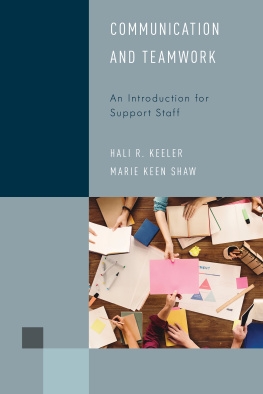
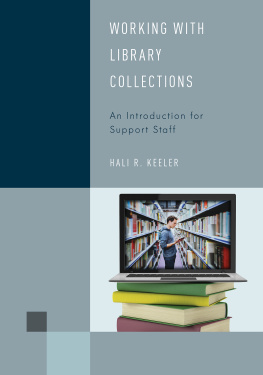




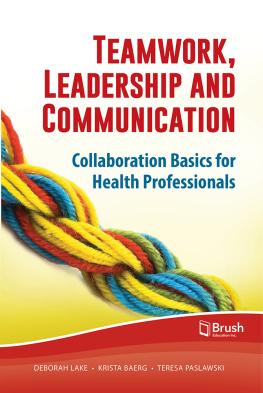
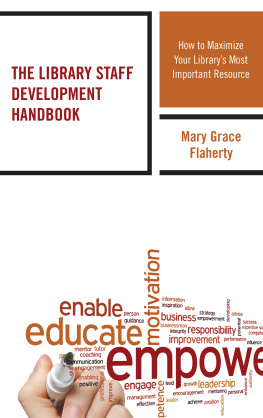


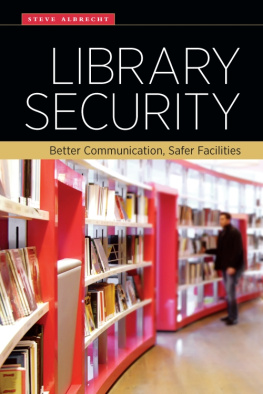
 The paper used in this publication meets the minimum requirements of American National Standard for Information SciencesPermanence of Paper for Printed Library Materials, ANSI/NISO Z39.48-1992.
The paper used in this publication meets the minimum requirements of American National Standard for Information SciencesPermanence of Paper for Printed Library Materials, ANSI/NISO Z39.48-1992.